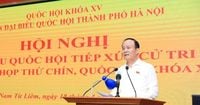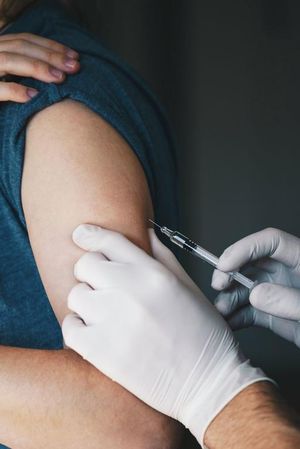In a startling revelation, authorities have dismantled a massive counterfeit milk powder production ring, raising significant public concern over food safety. This operation, which has been active for four years, involved the manufacturing of nearly 600 types of fake milk products, generating an astonishing revenue of nearly 500 billion VND (approximately 21 million USD). Alarmingly, many of these counterfeit products were targeted at vulnerable groups, including kidney patients, diabetics, premature infants, and pregnant women.
The counterfeit milk production was not just about poor quality; it involved sophisticated methods of deception. The culprits created fake packaging and filled it with milk of unknown origin, often of substandard quality. In some cases, they used well-known brand packaging but substituted the contents with inferior milk. The operation’s scale and the potential health risks posed to consumers have left many questioning the integrity of the food supply chain.
According to reports, the company behind this operation had established itself as a legitimate business, producing various milk brands and launching aggressive advertising campaigns to saturate the market. However, the ingredients they claimed to include, such as bird's nest extract, cordyceps, macca powder, and walnut powder, were mere fabrications. Instead, these were replaced with cheaper raw materials and additives, creating a product that was far from what consumers expected.
Consumers are now being cautioned against over-relying on milk products as a cure-all solution. Previously, in Dong Ha City, a particular milk product was heavily advertised as a remedy for various ailments, leading many to invest significant amounts of money in these products. The company behind this was known for offering promotions, such as discounts for bulk purchases and loyalty points, which further incentivized consumers to buy without scrutiny.
Milk is universally consumed across all age groups, and as living standards rise, so does the demand for quality milk products. However, the rise of multi-level marketing strategies and social media advertising has made it easier for counterfeit products to reach consumers. Many brands leverage the trust associated with doctors, nutritionists, and celebrities to endorse their products. For instance, the Hiup milk brand, which claims to promote height growth in children, has gained popularity largely due to its association with a well-known television presenter.
Online sales have further complicated the issue. Sellers often create numerous Facebook accounts that mimic legitimate businesses, using similar images and content but lacking specific contact details. This has left many consumers confused about which pages are authentic. Prices and promotional offers vary widely, and some customers only realize they have been misled after making a purchase.
Rance Pharma, the company implicated in the counterfeit operation, claimed to have been in the pharmaceutical and health food industry for over 15 years, asserting that their products met FDA standards and were available nationwide. Such claims, however, have proven to be misleading, as the counterfeit products disrupted the market and posed significant health risks, particularly to children.
Parents often rely on advertising rather than scrutinizing product labels and origins, which creates opportunities for counterfeit milk powder to infiltrate the market. The proliferation of milk products online, aimed at children, adults, and pregnant women, has further complicated the situation, as the origin and quality of these products are rarely verified.
Distinguishing between genuine and counterfeit milk is not an easy task, particularly with the sophisticated methods employed by counterfeiters. Market management agencies are now being urged to develop displays that help consumers identify real versus fake products. Popular brands such as Glucerna, Abbott Grow, PediaSure, and Ensure Gold are frequently counterfeited, making it essential for consumers to learn how to identify authentic products through barcodes, expiration dates, packaging details, and even taste.
In light of these revelations, it is crucial for consumers to choose milk products based on their age, health needs, and nutritional requirements rather than simply relying on advertising claims. Parents, in particular, are encouraged to seek nutritional advice, read labels carefully, and verify product information to safeguard their children from potential health risks.
Meanwhile, in a related development, voters in Hanoi have expressed their outrage over the production of counterfeit goods and misleading advertising. During a meeting on April 18, 2025, Nguyen Ngoc Tuan, the Chairman of the Hanoi People's Council, addressed concerns raised by voters from Cau Giay, Nam Tu Liem, and Thanh Xuan districts. The voters demanded strict penalties for counterfeit production and trading, as well as rigorous control over false advertising on media platforms.
Voters voiced their frustrations regarding various pressing issues, including environmental pollution, counterfeit goods, and cybercrime. They called for stringent measures against the production and trading of counterfeit products and requested that authorities take a firmer stance against illegal personal data trading. The need for a robust legal framework to protect citizens in the digital age was also highlighted.
In response to these concerns, Tuan assured voters that the city is implementing decisive measures to tackle environmental pollution and improve public safety. He emphasized the importance of effective land use and the need to resolve delayed projects, which have been a source of frustration for residents.
As the public becomes more aware of the dangers posed by counterfeit products, it is imperative for authorities to take swift action to protect consumers and maintain the integrity of the food supply chain. The recent uncovering of the counterfeit milk operation serves as a critical reminder of the potential risks associated with unregulated markets and the need for vigilance among consumers.





